
Research Projects
The impact of climate change on the world's oceans represents an undeniable societal challenge. My research has consistently focused on the molecular responses of marine microorganisms to environmental stresses, utilising cutting-edge proteomics methods, which are rare even at the international level. The original methods I have used and developed in proteomics can be extended to various fields outside environmental science, such as clinical research or pharmaceuticals, and have led to many exciting international collaborations.
I have built an international, and multidisciplinary research group in environmental and molecular microbiology at the University of Stirling. I have developed research projects with colleagues in countries all around the world, including Belgium, France, Spain, Germany, USA, Chile, India, Singapore, Thailand, Indonesia, Malaysia contributing to the international reputation of my laboratory. Over the past 8 years working at the University of Stirling, I have demonstrated a strong track record in attracting external funding for research, securing grants, and obtaining PhD studentships. In my capacity as both the principal investigator (PI) and co-investigator (Co-I), I have successfully secured over £1.6 million as the Principal Investigator, and a total of over £2.2 million, including my Co-I activities.
Current Projects - Plastic Pollution - [2020 - present]
Plastic Project
UK / SE Asia
NERC - UK / NSF - Singapore
PI: Sabine Matallana-Surget
NERC / NRF Grant, UK PI – (Nov 2020 – Nov 2023) – Understanding the Impact of Plastic Pollution on Marine Ecosystems in South East Asia - South East Asia Plastics (SEAP) – Programme – Title of the project: Sources, impacts and solutions for plastics in South East Asia coastal environments. Total Budget awarded: £1,390,248
I am currently leading a large international consortium on Plastic Pollution in South East Asia (NERC Award No. NE/V009621/1, NRF-NERC-SEAP-2020-0003), comprised of 22 partners, from 6 countries (UK, Singapore, Malaysia, Indonesia, Thailand, and Belgium). This consortium is part of the South East Asia Plastics (SEAP) Programme, and the awarded ongoing project is entitled 'Sources, Impacts, and Solutions for Plastics in Southeast Asia Coastal Environments' (website under construction). The research activities that I lead at UoS aim to characterise the functioning and activity of microbial biofilms inhabiting (micro)plastic debris collected across Southeast Asia, using innovative tools, such as metaproteomics, in order to better understand the risk for human health, fisheries and aquaculture.
Website Under Construction
〰️
Coming Soon
〰️
Website Under Construction 〰️ Coming Soon 〰️
The South East (SE) Asian region is facing one of the most important marine plastic pollution crises on our planet, threatening the biodiversity of marine ecosystems, coastal tourism, fisheries and aquaculture, which are vital for the economic growth of the region. Plastics debris are persistent in the marine environment and are dominated by the smaller abundant plastic particles (<5 mm) defined as microplastics (MPs) that are of increasing concern. The toxicity of marine MPs vary with their abundance, size, shape, chemical properties, and composition of the microbial biofilm. The surface of MP particles, referred to as the plastisphere, serves as a support for the colonisation of microorganisms where they may be protected area with limited predation. Microbial biofilms inhabiting the plastisphere are specific to this habitat. The microbial community colonising MPs, presents a wide range of metabolic functions, is composed of different trophic levels (e.g. phototrophs, (photo)heterotrophs, symbionts), and can include both plastic degraders and/or harmful pathogens. Determining the microbial composition of the plastisphere and the environmental conditions favouring the colonisation of key species is of critical and immediate importance to understand, the functional traits and dynamics of bacterial communities involved with plastic degradation (to identify future bio-recycling/remediation strategies) and/or pathogens (to limit the pathways for human exposure to pathogens, e.g.during recreational use of coastal environments, and understand the risk of microbial diseases in fish and mollusks, a major source of loss in fisheries and aquaculture).
Our project assesses the impacts of plastic pollution in SE Asia at both the molecular and the organismal level.
Aim and Research questions: The widely cross-disciplinary international team that I lead as UK-PI is currently tackling plastic pollution in coastal environments of Singapore, Malaysia, Indonesia and Thailand. We quantify the impact of marine plastics at different trophic levels from the complex plastisphere to bivalves and fish. The overarching aim of this project is to provide new insights on the biological and photochemical degradability of marine MP, deciphering the role of the plastisphere for degrading marine MPs and disseminating pathogens to human and aquaculture receptors. Our long-term vision is that our results will benefit the overall economy in SE Asia by providing the necessary knowledge to reduce the volume of marine MPs, which will ultimately lead to healthier fisheries and aquaculture. Specific questions that our project addresses:
1. What are the sources, sinks and transport pathways of marine MPs?
2. What are the biological and photochemical processes involved in the degradation of different types of marine MPs?
3. What are the taxonomic and functional diversity profiles of plastisphere microorganisms compared to free-living bacteria in SE Asia?
4. Does the size, shape and chemical composition of marine plastic determine microbial community metabolism or is biogeographical region a more important driver?
5. Do the chemical contaminants and pathogens associated with plastic debris represent a significant threat to the aquaculture and/or tourism industries?
Using a multi-disciplinary approach, different scales of study (microcosm, mesocosm, in situ, and regional scale for environmental context), and a range of spatial and temporal sampling, this project is delivered through four interlinked work-packages (WPs). This project is highly collaborative as all partners are involved in different planned deliverables (see figures below). The results and outcomes of this project will be communicated via a dedicated website that is currently under construction and will be available in 2024.
If you would like to contribute to this project, find out more about the outcomes and/or collaborate with us, don’t hesitate to contact me using the Contact Tab.
We deploy advanced, state-of-the art techniques, such as acoustofluidics, metagenomics, metaproteomics amongst other, to tackle the plastic pollution crisis in SE Asia with this new angle.
Plastic Project
UK
NERC, UK
PI: Prof. Richard Quilliam
NERC Grant, Co-I – (Jan 2019 – Jan 2023) – Microbial hitch-hikers of marine plastics: survival, persistence and ecology of microbial communities in the 'Plastisphere'.
Completed Projects
Carnegie Trust, UK
Principal Investigator
Assessing the toxicity of UV-filters found in cosmetics and personal care products: Invisible threat to Ocean sustainability.
PI: Dr Sabine Matallana-Surget
Funded by: The Carnegie Trust
15/09/2019–31/08/2021
Royal Society, UK
Principal Investigator
OCEANCLOCK: Light/dark cycle in picoplankton in response to environmental change
PI: Dr Sabine Matallana-Surget
Funded by: Royal Society
15/08/2017–14/08/2019
MicMAC: Microbiology via Modelling and Acoustics
PI: Dr Sabine Matallana-Surget
Funded by: Scottish Crucible
15/09/2015–30/11/2016
Microbiology via Acoustics: Bacterial Behaviour in Complex Microbial Communities (BBC MiC)
PI: Dr Sabine Matallana-Surget
Funded by: Engineering and Physical Sciences Research Council
01/01/2016–29/07/2016







